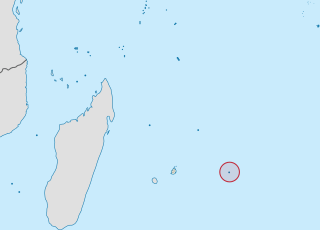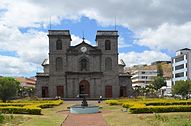
Mauritius, officially the Republic of Mauritius, is an island country in the Indian Ocean, about 2,000 kilometres off the southeastern coast of East Africa, east of Madagascar. It includes the main island, as well as Rodrigues, Agaléga, and St. Brandon. The islands of Mauritius including Agalega, St. Brandon and Rodrigues, along with nearby Réunion, are part of the Mascarene Islands. The main island of Mauritius, where the population is concentrated, hosts the capital and largest city, Port Louis. The country spans 2,040 square kilometres (790 sq mi) and has an exclusive economic zone covering 2,300,000 square kilometres.

Mauritian society includes people from many different ethnic groups as well as a significant population of mixed-race people who have ancestry from more than one ethnic group. A majority of the republic's residents are the descendants of people from India. Mauritius also contains substantial populations from continental Africa, China, France, and the East African island nation of Madagascar. Mauritius had a population of 1,235,260 according to the final results of the 2022 Census. The population on the island of Mauritius was 1,191,280, and that of Rodrigues island was 43,650 ; Agalega island total population of 330. Mauritius has the second highest population density in Africa. According to the 2022 census, the average age of the population was 38 years. 2022 Census indicated that: The proportion of children aged below 15 years went down from 20.7% in 2011 to 15.4% in 2022; The share of persons aged 60 years and over has risen from 12.7% in 2011 to 18.7% in 2022.

Rodrigues is a 108 km2 (42 sq mi) autonomous outer island of the Republic of Mauritius in the Indian Ocean, about 560 km (350 mi) east of Mauritius. It is part of the Mascarene Islands, which include Mauritius and Réunion. Like Agaléga, Rodrigues is a constituent island of the Republic of Mauritius, under the Constitution of Mauritius and still remains, as explicitly defined by the same Constitution, part of the Sovereignty of Mauritius, together with the following islands: "Agalega, Tromelin, Cargados Carajos, Chagos Archipelago ... Diego Garcia and other islands included in the State of Mauritius".
Mauritius is a multi-ethnic, multilingual and a plural society with a population composed mainly of four major ethnic and religious groups. It is often depicted as a "rainbow nation".

Islam in Mauritius is the nation's third largest religion behind Hinduism and Christianity. Muslims constitute over 17.3 per cent of Mauritius population. Muslims of Mauritius are mostly of Indian descent. Large numbers of Muslims arrived in Mauritius during the British regime, starting in 1834 as part of the large-scale indentured labor force from India.

Religion in the Faroe Islands is dominated by the Lutheran Christianity. Historically linked to both Norway and Denmark, the islands' religious evolution reflects a blend of Norse traditions and Danish influences. Although the Lutheran Church remains predominant, the islands also host an array of other religious groups, including smaller Protestant denominations, Catholics, and followers of non-Trinitarian religions.
Religion in Trinidad and Tobago, which is a multi-religious country, is classifiable as follows:
Mauritians of Chinese origin, also known as Sino-Mauritians or Chinese Mauritians, are Mauritians who trace their ethnic ancestry to China.

Christianity is the largest religion in Seychelles, with Roman Catholicism being its largest denomination.
Indo-Mauritians are Mauritians who trace their ethnic ancestry to the Republic of India or other parts of the Indian subcontinent in South Asia.

Christianity in Uzbekistan is a minority religion.

Religion in Guyana is dominated by various branches of Christianity, with significant minorities of the adherents of Hinduism and Islam.

Christianity is the largest religion in Nauru, with Nauru Congregational Church being the largest denomination, encompassing 35.71% of the population as of the 2011 census.

Constituencies of Mauritius are the electoral boundaries within the Republic of Mauritius. They are also commonly referred to as Circonscriptions amongst the locals. The country follows the Westminster system and elects 60 members of parliament for a term of 5 years. There are in all 21 Constituencies in the republic, each of them returning 3 members with the exception of Constituency No 21, which returns only 2 members. The Constitution stipulates that there shall be 20 constituencies and one created specially for the Rodrigues island.
Nowadays, no one could still claim his pure race status. Ethnic, social and linguistic differences become each day more and more present and marked all over the world. Time, history and continuous population intermingling across boundaries led to create cosmopolitan beings, that is to say world citizens who, in spite of their singularity, manage to bring themselves together in order to create a unique and single nation. Among the nations most affected by this cross-fertilization is notably found Mauritius. The social and linguistic diversity of this country makes it unique and contribute to its wealth. It arouses curiosity, urges us to deepen our knowledge on the subject and is, to this extent, worth being studied.

Christianity is the largest religion in Mizoram. The majority 87% of Mizoram population are Christian in various denominations, predominantly Presbyterian. More than 98% of the Mizos are Christians by faith. The Government of Mizoram declared that Christianity plays a very important role among the daily life of Mizo community and therefore further declared that Christianity as the religion of the state. The culture of Mizoram is mainly influenced by Christianity. Hence, Christianity was given a special status on the state by the government while maintaining a minimum level of secular environment and approach. In June 2018, the government of Mizoram including Vanlalruata, president of anti-corruption organisation-turned-political party, People's Representation for Identity and Status of Mizoram claim that Mizoram is a Christian state. Hindus form a small minority (3.55%) mainly of Manipuris and there are also around (7.93%) Buddhists according to the 2001 census, mostly made up from Chakma settlers of Arakan origin. There are about 8,000 mostly ethnic Mizo followers of a Judaic group Bnei Menashe, who claim descent from the biblical Menasseh. Muslims make up about 1.1% of the state population.

Mauritius is a religiously diverse nation, with Hinduism being the most widely professed faith. According to the 2011 census made by Statistics Mauritius, Hinduism is the major religion at 48.54%, followed by Christianity at 32.71%, followed by Islam 17.30% and Buddhism 0.18% in terms of number of adherents.
The 1999 Mauritian riots were national-scale rioting and protests in Mauritius following the death of the popular "seggae" musician Joseph Réginald Topize, better known by his stage name "Kaya", in police custody. The rioting lasted for four days from 21 to 25 February 1999. Four civilians and one police officer were killed in the riots with hundreds of people suffering injuries. It was the first incidence of mass rioting in Mauritius since the country's 1968 riots. The riots resulted in a majority of the island's police stations being sacked by protesters with 250 prisoners escaping prison. Many businesses were looted and substantial property damage was done with over 200 vehicles being set on fire.
General Population on the island of Mauritius refers to the community of inhabitants who belong to the ethnic groups Mauritian Creoles and Franco-Mauritians. Within the General Population there is further division based on skin colour and social status. It also includes most of the inhabitants of Rodrigues as well as Chagossians who usually identify as Mauritian Creoles.















